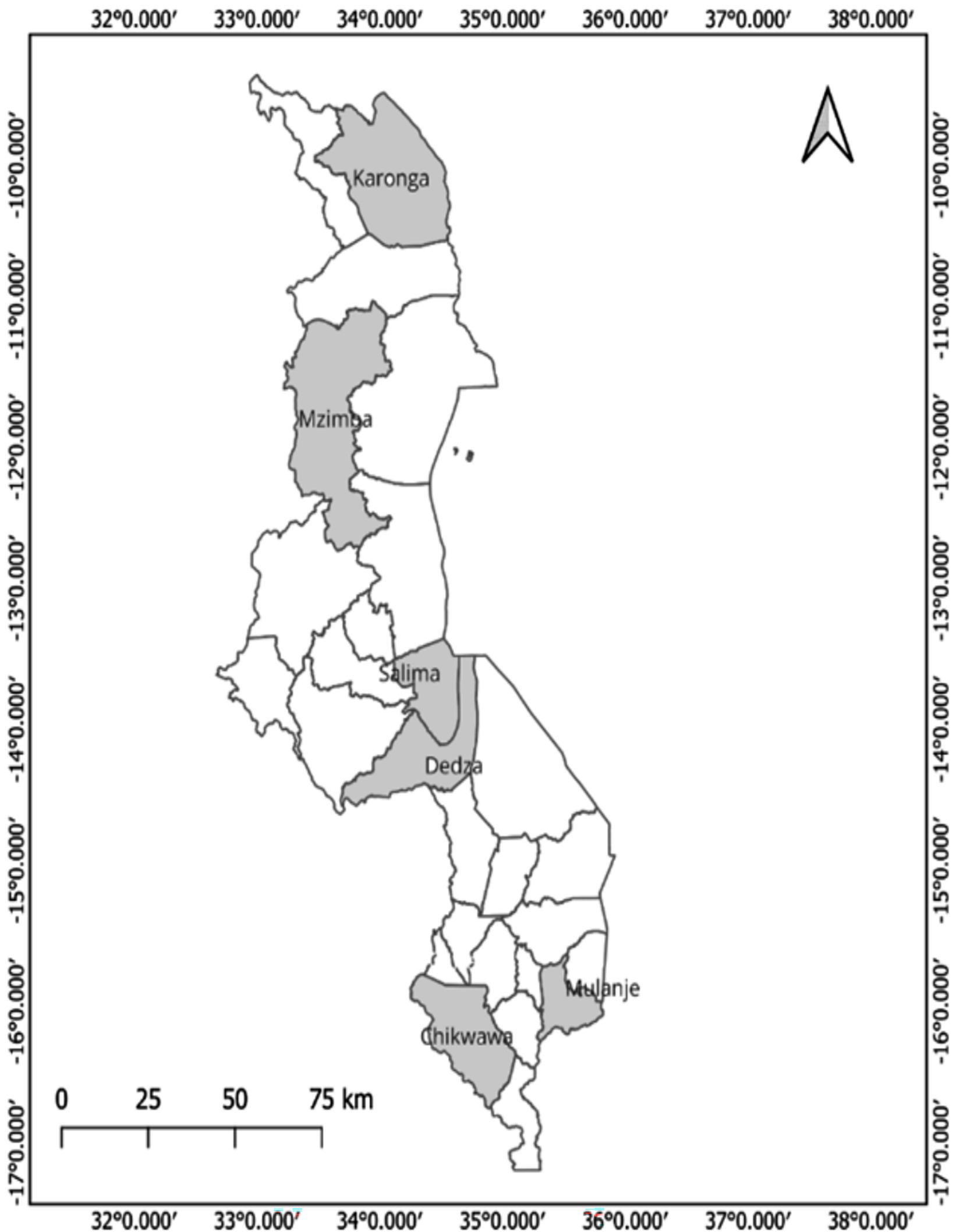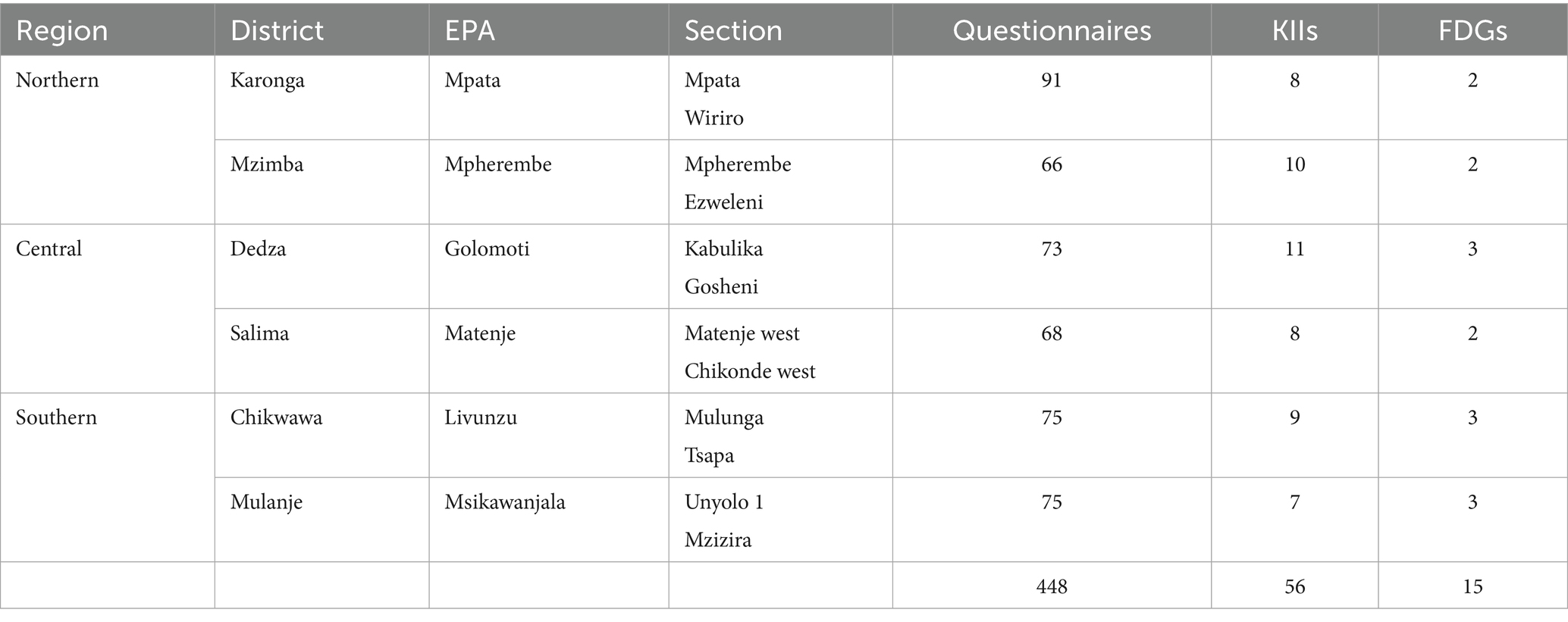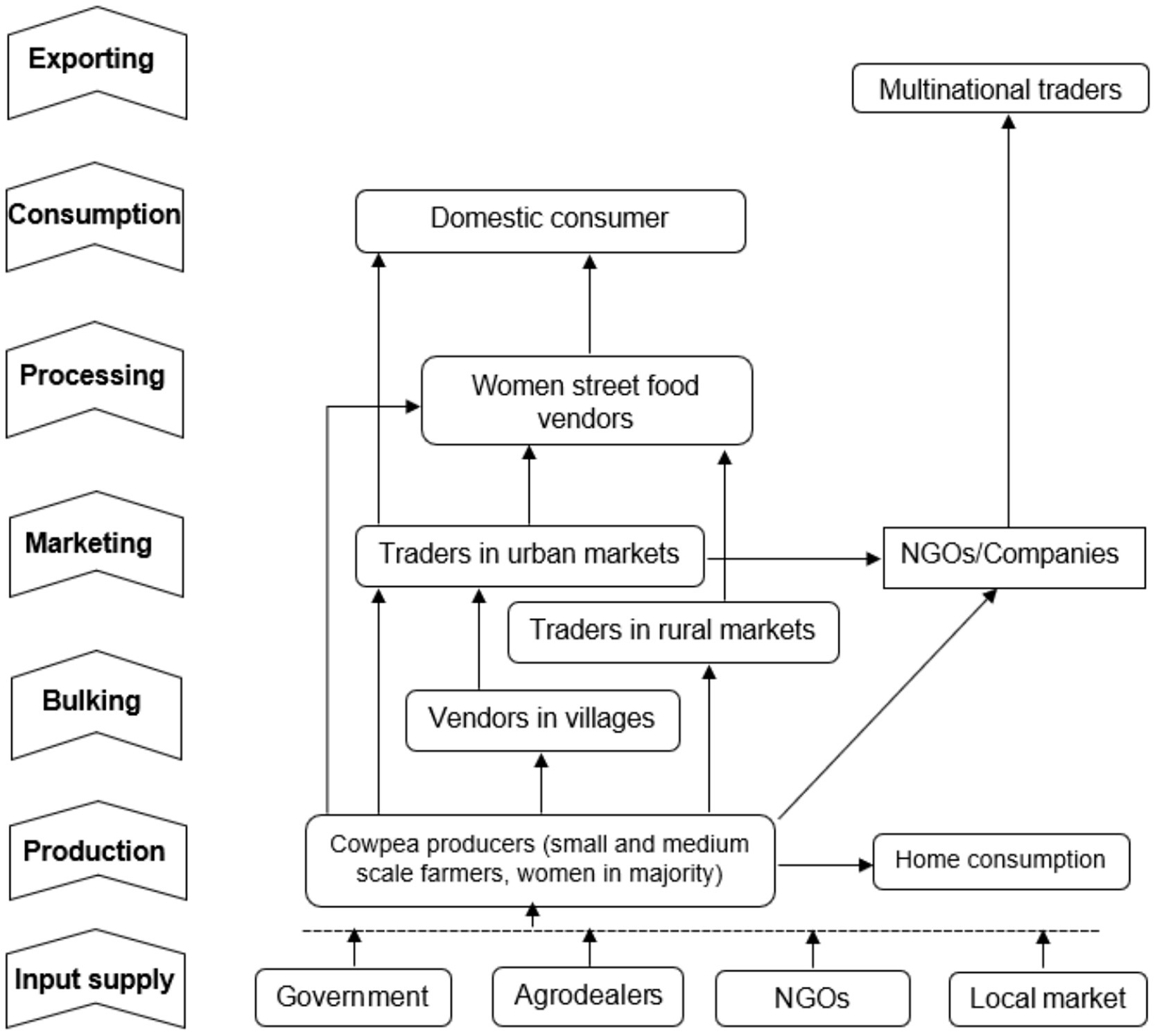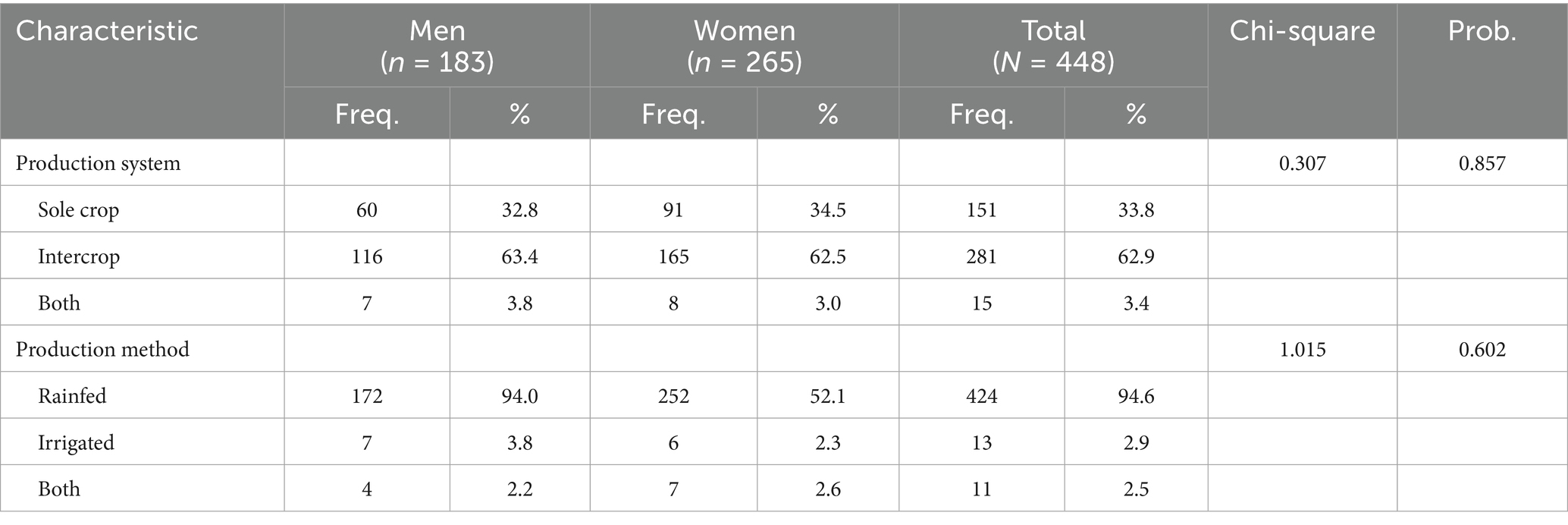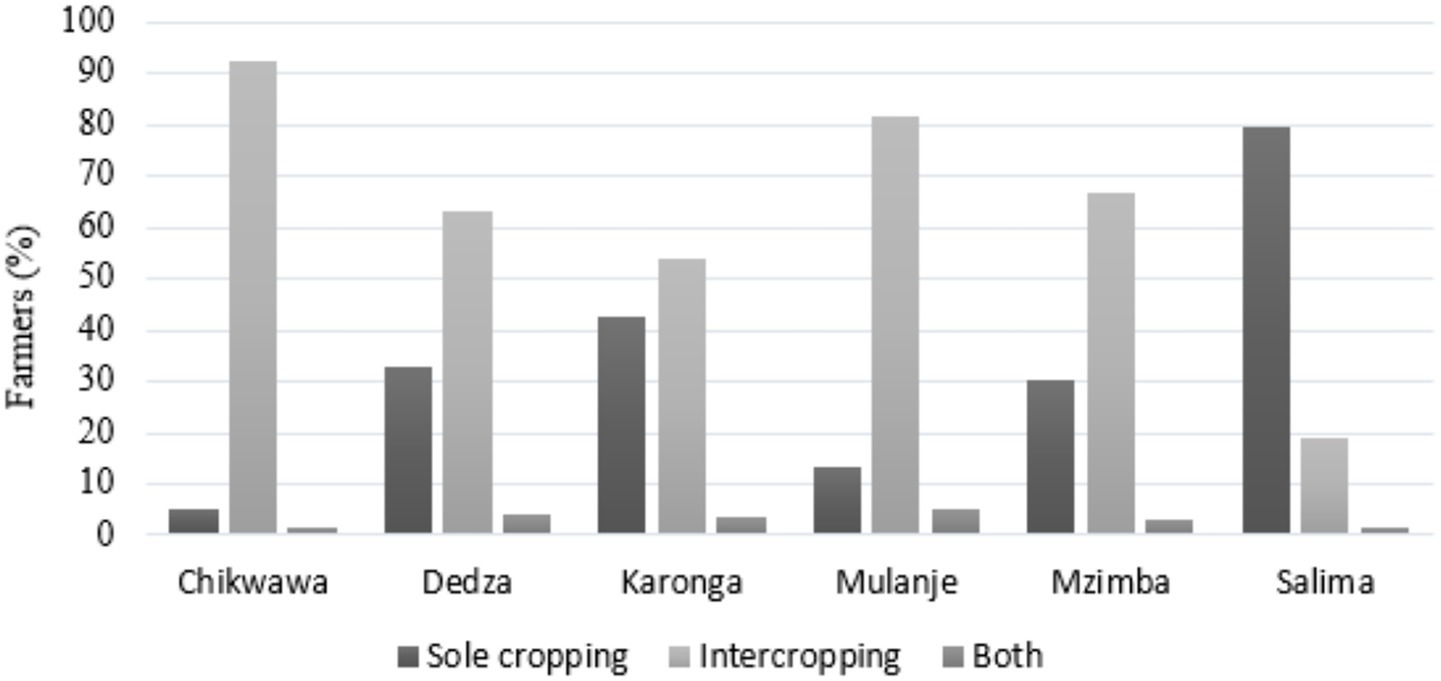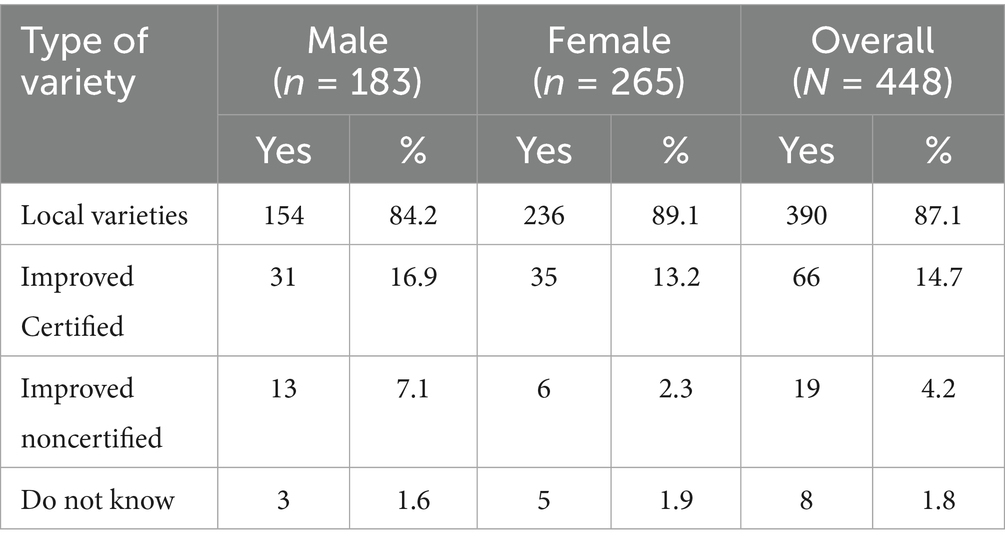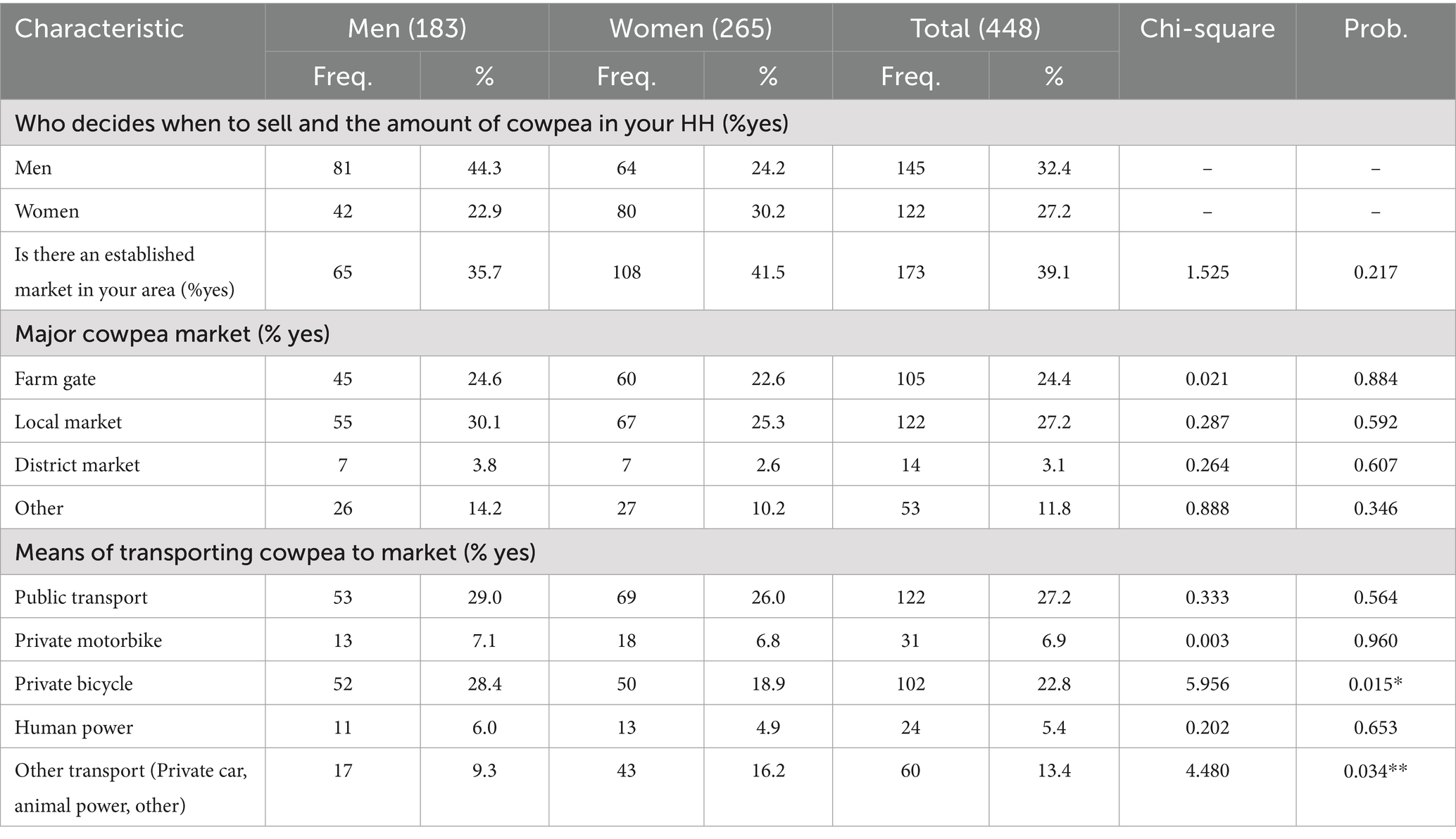- 1Human Ecology Department, Lilongwe University of Agriculture and Natural Resources, Lilongwe, Malawi
- 2Crop and Soil Science Department, Lilongwe University of Agriculture and Natural Resources, Lilongwe, Malawi
- 3Agriculture and Food Systems Department, Lilongwe University of Agriculture and Natural Resources, Lilongwe, Malawi
Introduction: Cowpea (Vigna unguiculata L. Walp) is a vital legume in Sub-Saharan Africa, contributing significantly to food security and nutrition. Despite its potential, cowpea remains underutilized in Malawi. This paper examines the cowpea value chain with a strong focus on production, utilization and distribution in Malawi from a gendered perspective, highlighting the value chain actors’ roles and challenges faced by men, women and youth from farm to fork.
Materials and methods: Using a mixed-methods approach, data were collected from six districts through surveys, key informant interviews, and focus group discussions. The study analyzed the involvement of different actors in cowpea production, processing, and marketing through gender lenses and identified the constraints they face.
Results: The findings reveal that women are actively involved in cowpea production but face constraints such as limited access to resources such as land and markets. The study also highlights the preference for local cowpea varieties among farmers and the specific traits they value by gender. Additionally, the active engagement of youth in cowpea production was noted, providing insights into their unique challenges and opportunities as they take part in this value chain.
Discussion and conclusion: This study underscores the need for gender-sensitive interventions to enhance cowpea productivity and market access, ultimately improving household income and food security among different gendered groups. The research contributes to the thematic area “Processing and Preservation of Indigenous Food Crops: Sustainable Agenda for Nutrition Security in The Global South” by documenting potential opportunities and constraints in the production and utilisation of this indigenous crop that has a lot of potential to significantly improve food security and nutrition needs for Malawian farmers. It also explores the cultural values and gender roles that influence the use of this indigenous food crop, providing a comprehensive understanding of the socio-cultural dynamics at play across the whole cowpea value chain. The study further concludes that, by addressing gender-specific constraints and promoting indigenous knowledge, it offers valuable insights for developing future interventions related to promotion of cowpea production and creating a conducive policy environment that supports the equitable growth of the cowpea value chain in Malawi and beyond.
Introduction
Grain legumes play a pivotal role in smallholder farming systems across Sub-Saharan Africa (SSA), serving as a source of food and nutrition security while providing a vital source of income for millions of farmers (Vanlauwe et al., 2019). Among these grain legumes, cowpea (Vigna unguiculata L. Walp) remains one of the most neglected and underutilized crops in many African countries, including Malawi (Gomes et al., 2021). Often referred to as the “poor man’s meat,” cowpea is a nutrient-dense crop with the potential to address malnutrition, especially among pregnant and breastfeeding women, and children under five years of age (Gomes et al., 2019). Its high protein and carbohydrate content, along with the nutritional richness of its leaves, make it an ideal crop for improving dietary diversity and combating nutritional deficiencies (Enyiukwu, 2018; Kirse and Karklina, 2015). Studies in Malawi have further shown the potential of incorporating cowpea into blended and complementary foods for infants and young children to reduce stunting and improve child health (Snapp et al., 2018; Stephenson et al., 2017). In addition, cowpea contributes to animal feeding (Abebe and Alemayehu, 2022), and sustainability of farming systems through nitrogen fixation, ground cover and weed suppression (Kebede and Bekeko, 2020).
Despite these benefits, cowpea production in Malawi is limited to specific regions, such as the Lower Shire Valley and areas south and southwest of Lake Chilwa, although it could thrive in most parts of the country (Benson et al., 2016). Productivity remains low due to pests and diseases, parasitic weeds, drought, limited access to high-yielding varieties, poor crop management practices, and reliance on landraces that tend to be low yielding and prone to biotic and abiotic stresses (Coulibaly et al., 2010; Hella et al., 2013; Nkongolo et al., 2009). While four improved varieties have been released, they remain inaccessible to farmers and lack farmer and consumer preferred traits. Broader institutional and socioeconomic factors such as weak extension systems and limited seed supply, further hinder adoption (Coulibaly et al., 2010).
Value chain analysis has been used in several crops such as pigeon peas, maize, ground nuts and soybean amongst others, to identify inefficiencies, improve productivity, and enhance market access (Branca et al., 2021; Chagomoka et al., 2014; Mango et al., 2018; Me-Nsope and Larkins, 2016; Rusike et al., 2019). However, such analysis have been overlooked in cowpea. Rusike et al. (2019), under the N2Africa project, reported that although the cowpea value chain in Malawi was fairly commercialized, it remained largely oriented toward home-based consumption, with between 40 and 100% of farmers only selling small portions of their harvests within 12 months. Similarly, Benson (2020) observed that cowpea is primarily produced for household consumption, though many farmers sell part of their harvest. A 2003 report from the Bean/Cowpea Collaborative Research Support Program (CRSP) also highlighted minimal processing of cowpea in Malawi, at both industrial and artisanal level, limiting its market potential. More recently, Dzanja et al. (2017) found that companies trading in cowpea in Blantyre and Lilongwe handled very small volumes compared to soybean, groundnut, and common beans, concluding that new processing strategies are needed to unlock their growth prospects. Other studies further identify persistent challenges along the cowpea value chain, including poor seed access, inadequate storage, limited market linkages, and weak institutional support (Muchemwa et al., 2022).
Beyond these production and market challenges, gender dynamics play a critical role in shaping agricultural value chains, yet they remain underexplored in cowpea systems. Value chains are not gender-neutral as they operate within specific social contexts that influence how opportunities, benefits and constraints are distributed among men and women (Rubin et al., 2009; Pyburn et al., 2023). Understanding these dynamics is therefore essential for effective gender mainstreaming, which requires clarity on how and where men and women participate in the chain (Poulsen, 2016). Since the emergence of gender-sensitive value chain approaches, scholars have increasingly emphasized the need to address persistent disparities (Okiror et al., 2021; Pyburn et al., 2023; Rubin et al., 2009; Quisumbing et al., 2021; Rubin et al., 2019; Rubin and Manfre, 2014; Uduji and Okolo-Obasi, 2024).
Women contribute substantially to crop production, processing, and marketing, but their participation is often constrained by systemic barriers such as limited access to land, credit, extension, and markets (Rubin and Manfre, 2014; Quisumbing et al., 2021). Evidence from Eastern Zambia shows that women’s participation in the cowpea value chain increased production, marketing, and adoption of improved varieties, reducing food insecurity and asset-based poverty. However, challenges such as limited assets, technologies, and mobility persisted (Gondwe et al., 2017). In Malawi, gender analyses of other legumes such as pigeon pea reveal that women are concentrated in low-return segments of the value chain due to cultural and structural barriers (Me-Nsope and Larkins, 2016).
Although several studies in Malawi have explored various aspects of cowpea production and utilization (Benson, 2020; Hella et al., 2013; Nkongolo et al., 2009; Stephenson et al., 2017), few have explicitly applied a gender perspective to the cowpea value chain. This study seeks to fill the gap by (i) analyzing the roles and participation of women and youth in the value chain, (ii) assessing how their involvement impacts household income, nutrition, and food security, and (iii) identifying the gendered opportunities and barriers that shape participation in the value chain. By doing so, the study contributes to the limited literature on cowpea value chains and generates evidence to guide gender-inclusive agricultural development strategies in Malawi.
Materials and methods
Study area
Fieldwork was conducted in six districts across Malawi (Figure 1) between October and November 2021 as part of a larger multi-country project involving Malawi, Mozambique, and Tanzania under the Centre of Innovation for Crop Improvement for East and Southern Africa. The study was carried out with support from the United States Agency of International Development (USAID) through the Feed the Future Innovation Lab for Crop Improvement initiative. In Malawi, two districts were selected from each of the three administrative regions of the country to capture agroecological and market diversity, and these included Chikwawa and Mulanje (Southern Region), Dedza and Salima (Central Region), and Karonga and Mzimba (Northern Region). Selection of districts and focal study sites was guided by three criteria: (i) official agricultural production estimates highlighting their contribution to national cowpea output in the 2020/2021 season, (ii) consultations with district agricultural officers to confirm local importance of the crop, and (iii) presence of both men and women cowpea producers and consumers. Malawi’s agricultural extension services operate within an agroecological framework, dividing the country into eight Agricultural Development Divisions (ADDs). These ADDs are further subdivided into district agricultural offices and 187 Extension Planning Areas (EPAs), each comprising agricultural sections that include 5–15 villages (Kundhlande et al., 2016). The country has a subtropical climate characterized by a single rainy season from November to April and a dry season from May to October. Soil nutrient status varies significantly across the country due to differences in topography, parent materials, and management practices (Young and Stephen, 1965). As such, the study sites were selected taking into account these varied agro-ecological details that also affect cowpea production.
Research design and data collection
A mixed-methods approach was employed in the study, to provide a comprehensive understanding of the cowpea value chain. The quantitative mapping exercise captured labor allocation, returns, and ownership patterns, while the qualitative component explored the social and contextual factors shaping outcomes for men, women, and youth along the chain. Data collection included value chain mapping, a structured farmer and consumer survey, semi-structured key informant interviews (KIIs) with value chain actors and stakeholders (including traders, agro-dealers processors, extension workers, district agriculture officers, and community leaders), and gender-segregated focus-group discussions (FGDs) with smallholder farmers. The mixed methods approach addressed the limitations of surveys alone, which excluded key actors, and enabled a holistic perspective on the roles, responsibilities, and challenges faced by different groups within the cowpea value chain.
Value chain mapping
Given the absence of an existing cowpea value chain map in Malawi, the initial phase of the research focused on mapping with stakeholders to understand and identify the main cowpea players and their roles, mapping various segments of the value chain, and identifying main products and processes. The mapping process was guided by two key resources: Developing Gender-Sensitive Value Chains: A Guiding Framework (FAO, 2016) and Addressing Gender Inequality in Agriculture Value Chains: Sharing Work in Progress - On Track with Gender (Laven and Verhart, 2011). Participants included men, women, and youth involved in the cowpea value chain at specific value chain nodes and levels (i.e., village, community, and district). Specifically, each value chain mapping group comprised of cowpea farmers and consumers (10 men, 10 women, 5 young men, and 5 young women). Additionally, the group included representatives from traders and agro-dealers (five men and five women, where present), as well as agriculture extension workers and district agriculture officers where present. A detailed description of this process is available in our earlier work (Chipeta et al., 2024). Briefly, the value chain mapping exercise was split into three activities, which were done sequentially as follows:
1. Participatory Mapping: Groups collaboratively visualized actors, activities, flows, and relationships using flip charts and checklists, iterating until consensus was reached.
2. Horizontal and Vertical Integration: Product, service, and activity flows were traced to determine linkages across and within levels, highlighting gendered participation at each node.
3. Identifying Gendered Barriers and Opportunities: Participants validated and refined the map, discussing constraints, opportunities, and implications for survey and study tool development.
Farmer and consumer survey
The survey included a sample of 448 active cowpea farmers who also functioned as consumers, heads of their households, spouses, or just mere members. The sampling process followed a multistage approach to ensure a representative sample. In the first stage, districts and focal sites within each district (EPA sections) were selected in collaboration with agricultural officers. The selection considered contextual factors, for instance land inheritance systems such as patrilineal and matrilineal predominance. In the second stage, villages were randomly selected from a listing of villages within the EPA section using a simple random sampling technique. In the third stage, sample households were randomly selected from village-level lists of farm households engaged in cowpea production and consumption. This was facilitated by extension workers, who possessed the necessary knowledge and maintained records of farmers. The actual sample size for farm households was determined scientifically, using Cochran’s (1963) formula for determining a representative sample for a large population:
Where n is the sample size, Z is the chosen Z-score corresponding to the desired confidence level (i.e., 95%), e is the desired level of precision (i.e., 5%), and p is the estimated proportion of an attribute that is present in the population (50% is adopted to obtain maximum sample size), and q is 1-p. Although the initially calculated sample size was 385, other farmers also expressed interest during fieldwork. To maintain trust with the community and encourage future participation, these additional participants were therefore included in the survey. A structured questionnaire was then used to collect data on various aspects. These included demographic characteristics, asset holdings such as land, cowpea production decision-making, and production activities. The questionnaire also captured data on land allocation for cowpea production, production practices, varieties grown, and specific reasons for selecting specific varieties. Additionally, the survey explored cowpea marketing dynamics, post-harvest management practices, marketing constraints and other production challenges with gendered lens.
Focus group discussions
Focus group discussions (FGDs) were conducted following the farmer and consumer household survey with participants selected through the assistance of extension workers and lead farmers to ensure a representative sample, particularly among cowpea farmers. A gender- and age-sensitive approach was employed, with separate groups for men, women, and the youth to encourage open and inclusive discussions, especially for women and young participants. Standardized checklists were used to guide the discussions and the gathering of appropriate data from these sources. A total of 15 FGDs were conducted, including 6 with adult farmers (3 with women and 3 with men), 6 with young farmers (both men and women), 2 with lead farmers (not gender-segregated, based on availability), and 1 with community leaders (not gender-segregated, based on availability). Key topics explored during the FGDs included differences in land ownership among women, men, and youth; decision making processes in cowpea production; roles and responsibilities in cowpea production activities; preferred cowpea varieties by gender and the reasons behind these preferences; gender stereotypes related to cowpea production, buying, and selling; and other relevant issues.
Key informant interviews and observations
Key informant interviews were conducted with 56 participants, purposively selected based on their roles in the cowpea value chain and the richness of information they could provide. The participants included traders, processors, agro-dealers extension workers, community leaders, and policymakers. Traders and agro-dealers selected for these interviews had at least three years of active involvement in the legume market. Agro-dealers were interviewed to gather insights on the inputs they stock related to cowpea production, such as improved seed, pesticides, agricultural implements, and storage materials, as well as the gender of their primary customers. Traders were contacted to understand the dynamics of the cowpea movement within the value chain, including the gender distribution of the traders (men or women), the cowpea varieties they preferred to purchase, and whether women and men exhibit different preferences for certain varieties they come to buy. Processors were interviewed to explore the varieties processors use and their attributes, their main suppliers, main products and by-products from cowpea processing, and the target markets (whether local or export markets) with a gender lens. The discussions were guided by predetermined interview guides to ensure consistency and depth. In addition to the interviews, observations were used to validate and complement the research findings, providing a more comprehensive understanding of the context and dynamics.
Methods of data analysis
Quantitative data were analyzed using STATA (version 17) to generate frequencies, descriptive statistics, cross-tabulations, and chi-square test. Descriptive statistics provided a deeper understanding of data characteristics and preliminary insights into potential relationships between variables. Categorical variables were computed as frequencies and percentages to describe the distribution of each category within the variable. Cross tabulations were used to examine relationships between gender specific variables. These statistics helped to identify the most common categories and the proportion of observations falling into each group. Content and thematic analysis were used to analyze the qualitative data to identify value chain actors, roles, and gendered constraints and opportunities. Insights were interpreted using Kabeer’s Social Relations Framework within domains like household, community, state, and markets. Table 1 below shows all the study tools employed and type of respondents consulted.
Study limitations
The study encountered limited representation of some cowpea value chain actors, particularly processors and agro-dealers. This observation was itself a significant finding, suggesting that these nodes within the value chain are not yet fully developed at a larger scale in Malawi. Most cowpea processing occurs either at the household level or among small-scale traders. Similarly, with regard to agro-dealers, none were found to specialize in inputs specifically tailored for cowpea production. Nevertheless, a few agro-dealers and processors identified during the study were interviewed as key informants (KIIs).
Results and discussion
Demographic statistics
The demographic, socio-economic, and farm characteristics of survey respondents are presented in Table 2. Women represented 58.9% of the respondents, reflecting their central role in cowpea production and consumption. In sub-Saharan Africa, women have historically been the primary custodians of cowpea cultivation, often producing the crop under marginal conditions primarily for household consumption and food security. Despite their strong participation, gender disparities were evident in household headship as more men (83.5%) were household heads than women (23%). This pattern reflects broader gender norms in Malawi where men are more commonly recognized as household heads, while limited decision-making role is manifested amongst women. The average household size among respondents was 5 members, consistent with the generally large size of household structures of farming communities. The average age of participants was 41.1 years for men and 38.0 years for women, indicating that men were slightly older. About 44% of the respondents were aged 35 years or younger, highlighting the youth’s active involvement in cowpea production. This finding is particularly noteworthy given that the youth often shy away from agriculture in favor of more lucrative opportunities, a tendency perpetuated by systemic barriers such as restricted access to affordable agricultural inputs, land ownership, extension services, and reliable markets (Chinsinga and Chasukwa, 2018). The study further revealed that youth participation in cowpea production is largely market-driven, as their involvement increases when cowpea commands higher prices. This demonstrates how economic incentives can motivate young people to engage in agriculture.
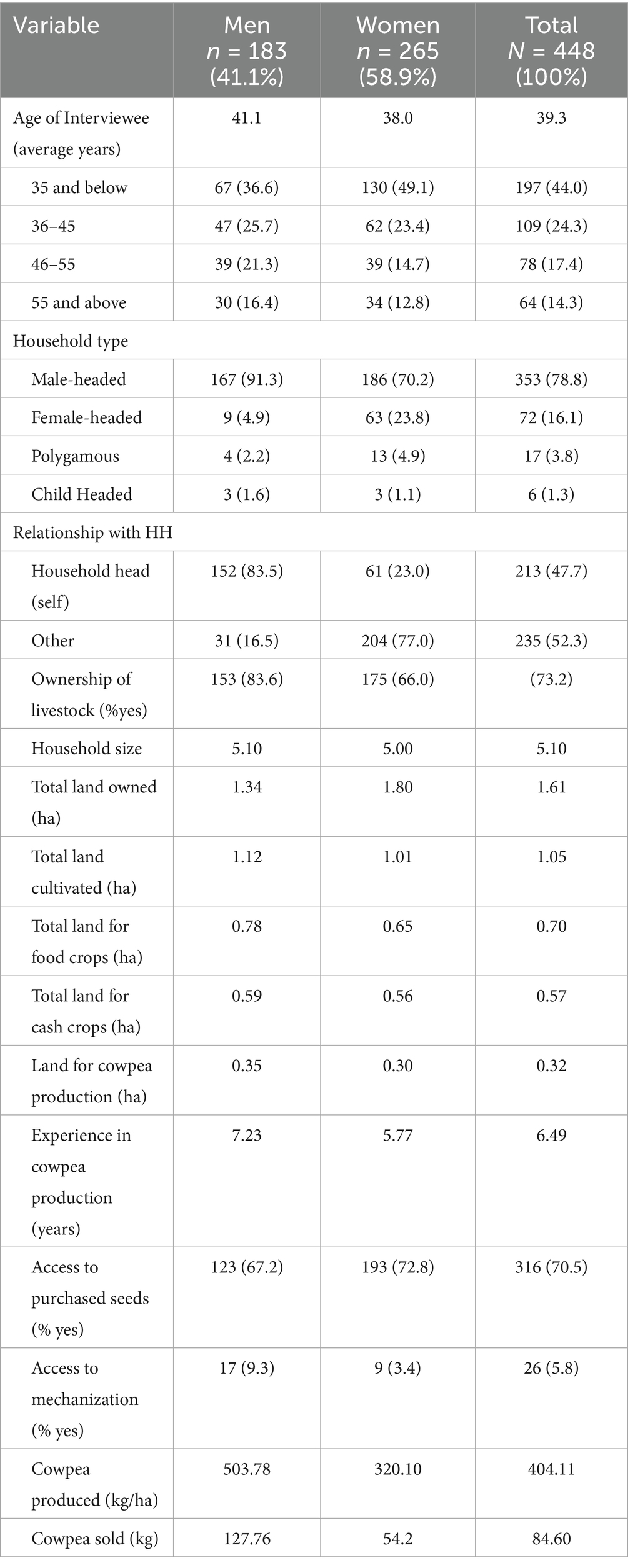
Table 2. Demographic, socio-economic, and farm characteristics of cowpea farmers and consumers surveyed in six districts in Malawi.
In terms of land ownership and usage which are critical for agricultural production, the respondents collectively owned an average of 1.61 ha of land, with 1.05 ha allocated toward agricultural production. Research shows that household farm and landholding sizes in Malawi are not only small but shrinking with 76% of farmers operating farms below one hectare (Muyanga et al., 2020). While men allocated slightly more land to both food crops (0.78 ha) and cash crops (0.59 ha) compared to their women counterparts (0.65 ha and 0.56 ha, respectively), these differences were not statistically significant. Men also had more experience in cowpea production, averaging 7.23 years, compared to 5.77 years for women. Additionally, the study revealed gender disparities in cowpea yield and sales during the 2020/21 growing season. On average, men achieved higher yields (503.78 kg/ha) than women (320.10 kg/ha). Similarly, men sold significantly larger volumes of cowpea (127.76 kg) compared to women (54.20 kg). These findings suggest that women face structural and resource-related constraints that limit both their productivity and market participation, as well as utilize more cowpea for home consumption than men.
Cowpea value chain mapping
The cowpea value chain in Malawi primarily revolves around two main products: dry (boiled) grain and fresh leaves. Dry cowpea undergoes several processing steps including shelling, winnowing, washing, and boiling, to prepare them for use as a relish. Fresh cowpea leaves, on the other hand, are typically cut into small pieces either manually using a knife or by hand, prior to cooking for immediate consumption. The cooked leaves can also be dried for long-term storage. In addition to these primary products, cowpea is sometimes processed into flour or a pulp locally known as chipere. Another popular product is badjia (mbadyira), a snack prepared by women street vendors to satisfy the cravings of urban consumers (Malidadi, 2006; Nkongolo et al., 2009). The data analysis resulted in a consolidated value chain map (Figure 2), which outlines the core functions and actors in the cowpea value chain. The key functions within the chain include input supply, production, aggregation, marketing, processing, and exporting. These represent the primary activities undertaken by different actors which include smallholder farmers (>98%), input suppliers (agro-dealers, government, non-governmental organizations), traders (aggregators), retailers, small-scale home-based processors and consumers. It was established that more than 75–80% of cowpea producers (production node) are women, while men constitute about 70–80% traders and agro-dealers across the cowpea value chain.
Input supply for cowpea production
Input supply is a critical component of the cowpea value chain, directly influencing both the yield and quality of cowpea production. It involves the provision of essential agricultural inputs to smallholder farmers ensuring they have the necessary resources for successful production of cowpea. The study reveals that the key providers of inputs including seeds, inoculants, and pesticides are the government (through research institutes), agro-dealers non-governmental organizations (NGOs), and local markets. Findings from the survey and interviews revealed that cowpea production in Malawi relies on limited inputs, mainly due to financial constraints faced by smallholder farmers both men and women. In other countries, the application of phosphorus-based fertilizers is advocated to enhance cowpea yields (Mohammed et al., 2020). However, the use of inorganic fertilizer in cowpea production remains uncommon among smallholder farmers. When cowpea is intercropped with maize, the fertilizer applied for maize management indirectly benefits cowpea, though it is not specifically targeted for this purpose (Dimande et al., 2024). On the other hand, the use of inoculants when planting is gaining traction with some farmers already adopting this practice. Pesticides are used sparingly, mainly for managing pest and disease pressures during critical growth stages. Agrodealers play a crucial role in providing agricultural inputs such as seeds, fertilizers, pesticides, herbicides, and agricultural equipment. However, none of the agro-dealers interviewed reported selling seeds of improved cowpea varieties indicating a gap in the availability of high-quality seeds through formal channels. The agro-dealers reported that their primary clients were men and women from the local community frequently purchasing pesticides and other inputs for cowpea production. However, interviews with farmers revealed that men are the ones who typically buy inputs from agro-dealers. Household responsibilities and safety concerns limit women’s mobility, reducing their likelihood of accessing distant markets where agro-dealers operate. This finding underscores the significant role that agro-dealers play in supporting local agriculture by providing essential resources. The concentration of their clientele within the local community suggests that agro-dealers have a substantial impact on smallholder farming practices and input accessibility.
Cowpea production practices
Cowpea production in Malawi is predominantly carried out during the rainy season, which spans from November to March. This seasonal pattern is supported by the majority (94.6%) of survey respondents, as highlighted in Table 3. However, in some parts of the country, cowpea is also produced under irrigation or using residual moisture, particularly when planted toward the end of the rainy season (relay intercropping). Both men and women engage in cowpea cultivation for various purposes, including food security, animal feed, income generation, and soil fertility improvement. Qualitative findings further reveal that farmers significantly increase cowpea production in response to rising market demand and improved market access. For example, a participant from Dedza explained:
“We have been cultivating cowpea in our household for as long as I can remember, but for the past 5 years, my husband and I have expanded our cowpea production because of the readily available market for cowpea at Golomoti. We can now generate more money from cowpea sales than before. Cowpea has replaced cotton as our primary cash crop in this area….” (FGD with Adult women-Dedza: 03/11/2021).
The study also highlights that inter-cropping cowpea with cereals such as maize, millet and sorghum, as well as with other legumes such as pigeon pea, common bean, soybean, and groundnuts is a widespread practice. Among these, the cowpea-maize intercrop is the most common. Farmers emphasize that intercropping optimizes land use and diversifies income streams. This practice aligns with findings by Silberg et al. (2017) who reported that over 50% of cropped fields on smallholder farms in Malawi are intercropped. This is consistent with farmers’ efforts to maximize returns on small landholdings, typically ranging from 0.5 to 1.5 ha. However, monocropping of cowpea is occasionally adopted, particularly in areas with strong market access. For instance, in Salima, 79.41% of respondents reported practicing monocropping for cowpea due to the presence of robust markets and foreign traders in the district (Figure 3). The study found that whenever this situation arises, men tend to dominate the production of the crop under monocropping because they are mostly responsible for deciding on land use in both matrilineal and patrilineal settings. Despite these practices, the level of mechanization among smallholder farmers remains low, with hoes being the primary tool for cultivation. This underscores the potential for significant productivity gains through the adoption of modern agricultural machinery and techniques.
Main cowpea varieties cultivated by farmers and their sources
The study explored the cowpea varieties cultivated by farmers, to determine the level of adoption of improved varieties and the use of certified cowpea seed in Malawi for both men and women. A significant majority of the respondents (87.1%) reported cultivating local varieties otherwise known as landraces, while 14.7% confirmed growing certified cowpea varieties. More men than women also grew improved, non-certified varieties (χ2 = 5.666, p = 0.017). The study also found that most farmers were unable to identify the trade names of the improved varieties they cultivated. This suggests that some farmers may have been growing improved varieties unknowingly, while others may have believed they were growing improved types when, in fact, they were not. This phenomenon bears a direct repercussion on the productivity of the crop as most landraces have low yield potential and high susceptibility to diseases, insect pests, and parasitic flowering plants like Striga and Alectra (Coulibaly et al., 2010). This pattern remained consistent across different demographic groups, including men, women, and youth. The rationale behind this inclination toward local varieties came to light during focus group discussions and interviews, where farmers and extension officers articulated the preference for these varieties due to specific quality traits lacking in improved varieties. Some of the traits preferred in local varieties over the improved varieties available in Malawi, as reported by the farmers included big grain size, white or purple color, good taste, prostrate to semi-prostrate growth habit, and good gravy quality. A detailed description of the preferences and how they vary across gender and age groups is available in our earlier work (Chipeta et al., 2024; Nkhoma et al., 2020). For instance, in one of the focus group discussions with adult men in Chikwawa, one participant explained:
“In our area, local varieties are preferred for home consumption because they taste better than improved varieties…” (FGD with Adult men-Chikwawa: 27/10/2021)
Further insights were provided by a key informant interview with a Dedza extension worker:
“Regarding cowpea varieties and traits preferred by farmers in this area, I have observed that local varieties with creeping traits, such as Kamanyazi and Kadzinyemba (also known as Chimbiri kumunda), are highly favored. These varieties are usually high-yielding and produce abundant leaves, providing households with relish for an extended period. While Kadzinyemba is not particularly high-yielding in terms of grain, it is popular for its high leaf yields, grain taste, and disease resistance compared to improved varieties. Farmers are well aware of the benefits of the crops they grow, as well as those introduced to their communities. However, their choice of variety depends on the benefits they derive or their lack of access to improved varieties.’ (KII with Dedza Extension Worker: 02/11/2021).
Table 4 below further shows cowpea variety preferred by farmers by gender:
These findings reveal the similarities and differences in preferences present among different gender groups in Malawi for various cowpea varieties and traits. While local varieties were generally preferred by men and women (84.2 and 89.1% respectively), there was a slight difference in variety percentage preference for women (35% versus 31% men) where traits such as cooking time ranked highly for adult females and female youths (see also Chipeta et al., 2024). This could be a result of the gender-differentiated roles which are socially constructed. These findings are in agreement with some scholars who assert that since in most cases females are the ones involved in food preparation, their need to ease their role or achieve this role, relative to other reproductive roles will make women more inclined to prefer a fast-cooking variety (Egbadzor et al., 2013).
Furthermore, it was noted that, apart from trait preferences, the availability of seeds and markets demanding specific varieties plays a critical role in farmers’ decisions to grow improved cowpea varieties. In some areas, organizations and companies, such as Peacock Seed Company, have distributed seeds, making improved varieties accessible to farmers. However, in the absence of profitable markets for these varieties, farmers often discontinue their cultivation, as the primary motivation for growing them is market-driven. In terms of seed sources, approximately 52.9% of farmers saved seeds from the previous season’s harvest for use in the subsequent farming season, while 45.3% opted to purchase seed from local markets (Table 5). Additionally, 16.3% obtained seeds from their neighbors, with roughly 4.9% buying seeds from agro-dealers. A chi-square test (Table 6) revealed no significant gender differences in sourcing seed from the previous harvest, agricultural institutions, agricultural fairs, or agro-dealers. However, significant differences were observed in sourcing seed from local markets (χ2 = 11.028, p = 0.001), neighbors or friends (χ2 = 4.840, p = 0.028), and agro-dealers (χ2 = 4.508, p = 0.034). These results indicate that more women sourced their seed from local markets, while more men obtained seed from agro-dealers and from neighbors or friends. The study further examined whether these trends varied among age groups. As shown in Table 6, variations among farmers of different age groups were minimal, with previous harvests, local markets, and neighbors being the primary seed sources. However, a majority of youthful farmers (58%) purchased seeds in the form of grains from local markets. The limited availability of cowpea seeds in most agro-dealers’ inventories in Malawi partly explains the low reliance on this source.
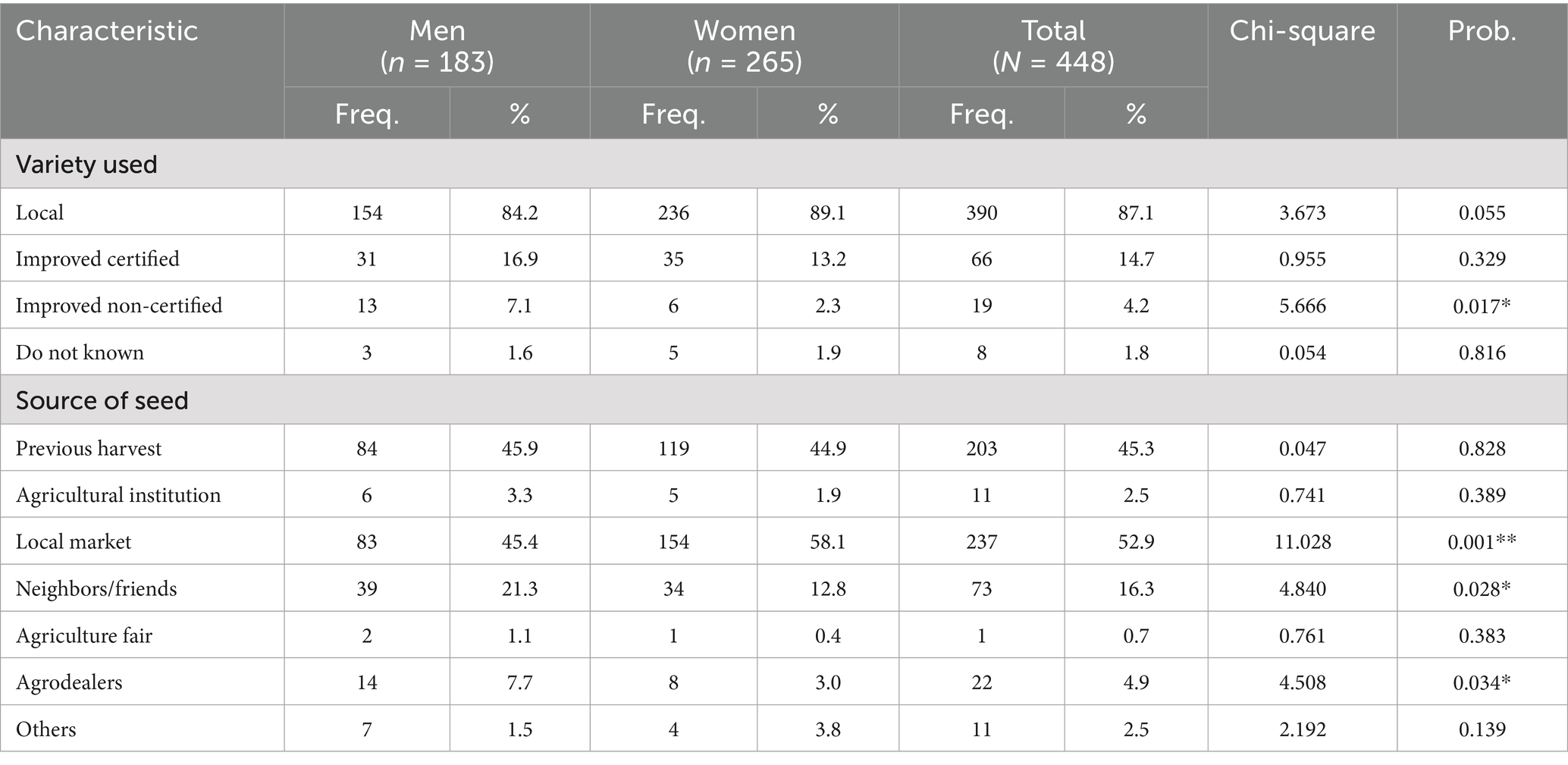
Table 6. Source of cowpea seed for smallholder farmers by gender across districts surveyed in Malawi.
Constraints on cowpea production
Cowpea production in Malawi faces significant productivity challenges. The study identified key constraints, including insect pests and diseases, drought exacerbated by climate change, limited access to technological information, lack of credit access, and post-harvest losses (Table 7). Among these, insect pests and diseases emerged as the most critical affecting cowpea production, impacting about 80% of the respondents (χ2 = 0.646, p = 0.421) (Table 6). This challenge was consistently cited by both men and women, indicating the urgency of addressing the insect pests and diseases challenges. Apart from causing direct crop losses, farmers reported increased production costs due to the need to purchase pesticides for pest control. Common pests such as aphids, flower thrips, pod borers, and bruchids damage cowpea at various growth stages, indicating the urgency of addressing it (Tazerouni et al., 2019). Additionally, cowpea is susceptible to fungal, bacterial, and viral diseases, which can lead to yield reductions (Boukar et al., 2019), and even complete crop loss (Nsa and Kareem, 2015).
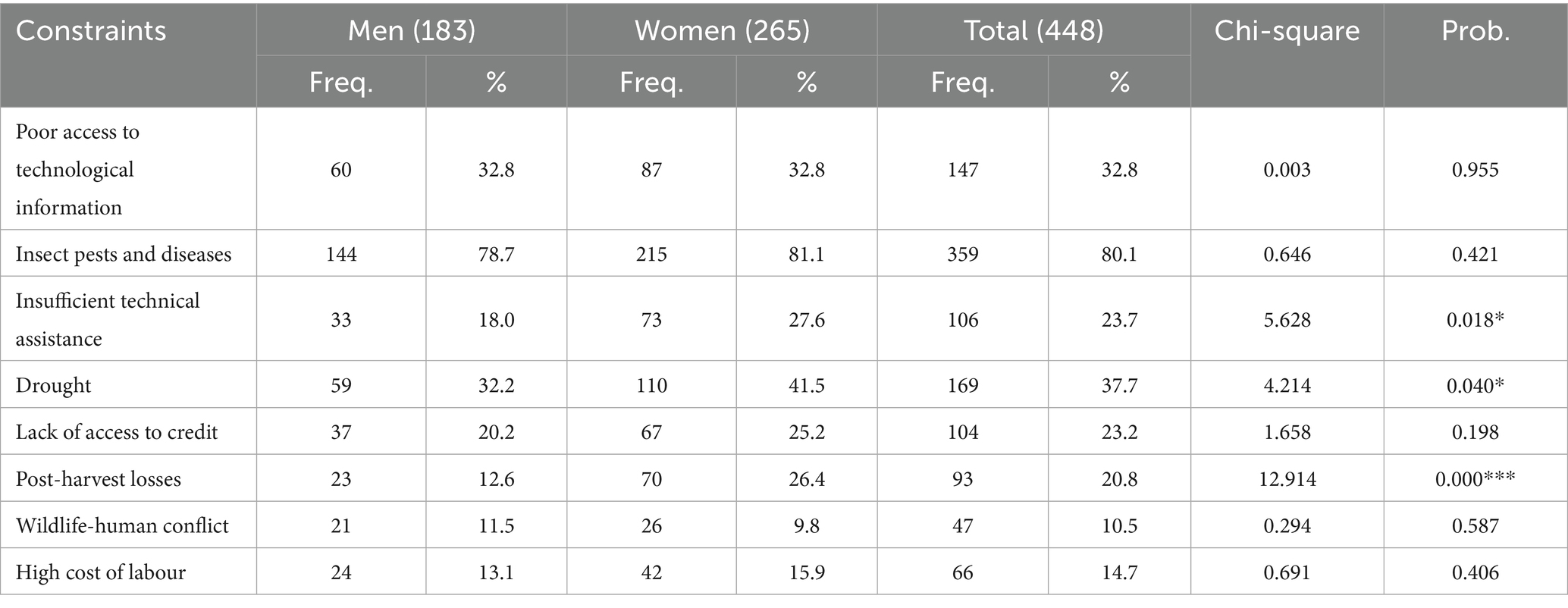
Table 7. Constraints faced by men and women in cowpea production across districts surveyed in Malawi.
Despite cowpea’s inherent drought tolerance, drought remains a notable challenge, affecting about 37.7% of farmers. This constraint showed a significant gender difference, with more women (41.5%) than men (32.2%) reporting it (χ2 = 4.214, p = 0.040). Drought adversely impacts cowpea growth, development, and reproduction ability, ultimately limiting yield and productivity (Gomes et al., 2020). This finding highlights the need to develop drought-tolerant cowpea varieties, particularly in the context of climate change, to ensure stable yields during periods of water scarcity.
In addition to biotic and abiotic challenges, 32.8% of farmers reported difficulties in accessing relevant technological information (χ2 = 0.003, p = 0.955), such as improved cowpea varieties, safe storage techniques and correct use of pesticides. This constraint is particularly critical as it directly hinders the adoption of modern farming practices, innovative technologies, and improved cowpea varieties. While there is a wealth of research on technology adoption in developing countries, studies have shown slow and low adoption rates, even for technologies with the potential to enhance agricultural productivity (Yigezu et al., 2018). Factors such as economic constraints, information access, and awareness play pivotal roles in technology adoption. However, access to finance is especially critical for capital intensive technologies (Nakano and Magezi, 2020). Notably, the ranking of these constraints was consistent across gender groups, indicating that these issues are pervasive and affect all farmers similarly.
Other reported challenges included insufficient technical assistance, which was significantly more common among women (27.6%) than men (18.0%) (χ2 = 5.628, p = 0.018). The dominance of men in Malawi’s extension system creates notable barriers for women farmers, and cultural norms may limit the ability of women to directly engage with men extension officers. Lack of access to credit was also noted, although the difference between women and men was not statistically significant (χ2 = 1.658, p = 0.198). Post-harvest losses disproportionately affected women (26.4%) compared with men (12.6%) χ2 = 12.914, p < 0.001. Women may face greater post-harvest losses due to limited access to appropriate storage facilities and the inability to afford storage chemicals. Additional constraints such as human-wildlife conflict (χ2 = 0.294, p = 0.587), and high labor costs (χ2 = 0.691, p = 0.406) were also reported but showed no significant gender differences. Addressing these constraints requires a multifaceted approach. Breeding efforts should focus on developing cowpea varieties with resistance to insect pests, diseases and drought. This may be achieved through the use of molecular tools that also help to deliver varieties with speed. Involving farmers in variety design to incorporate their preferred traits is also essential to promote varietal uptake. Enhanced extension services, increased access to credit, and improved access to market information are critical steps toward promoting the adoption of improved cowpea varieties and ultimately increasing crop productivity.
Post-harvest handling
Post-harvest losses pose significant challenges for cowpea farmers in Malawi, primarily due to weevil infestation, grain rotting, and pod or grain damage. The lack of proper storage facilities exacerbates these losses, especially for women. The study found that weevil infestations were the leading cause of post-harvest losses, affecting approximately 49.1% of respondents (Table 8). Grain rotting was reported by 19.6% of farmers, while 10.0% encountered issues with pod or grain splitting. Additionally, 12.3% of farmers cited livestock and rodents as problematic. Most participants (56.5%) indicated that the highest losses occurred during storage, primarily due to weevil damage. This finding highlights the critical challenge many farmers face in managing weevil infestations during storage.
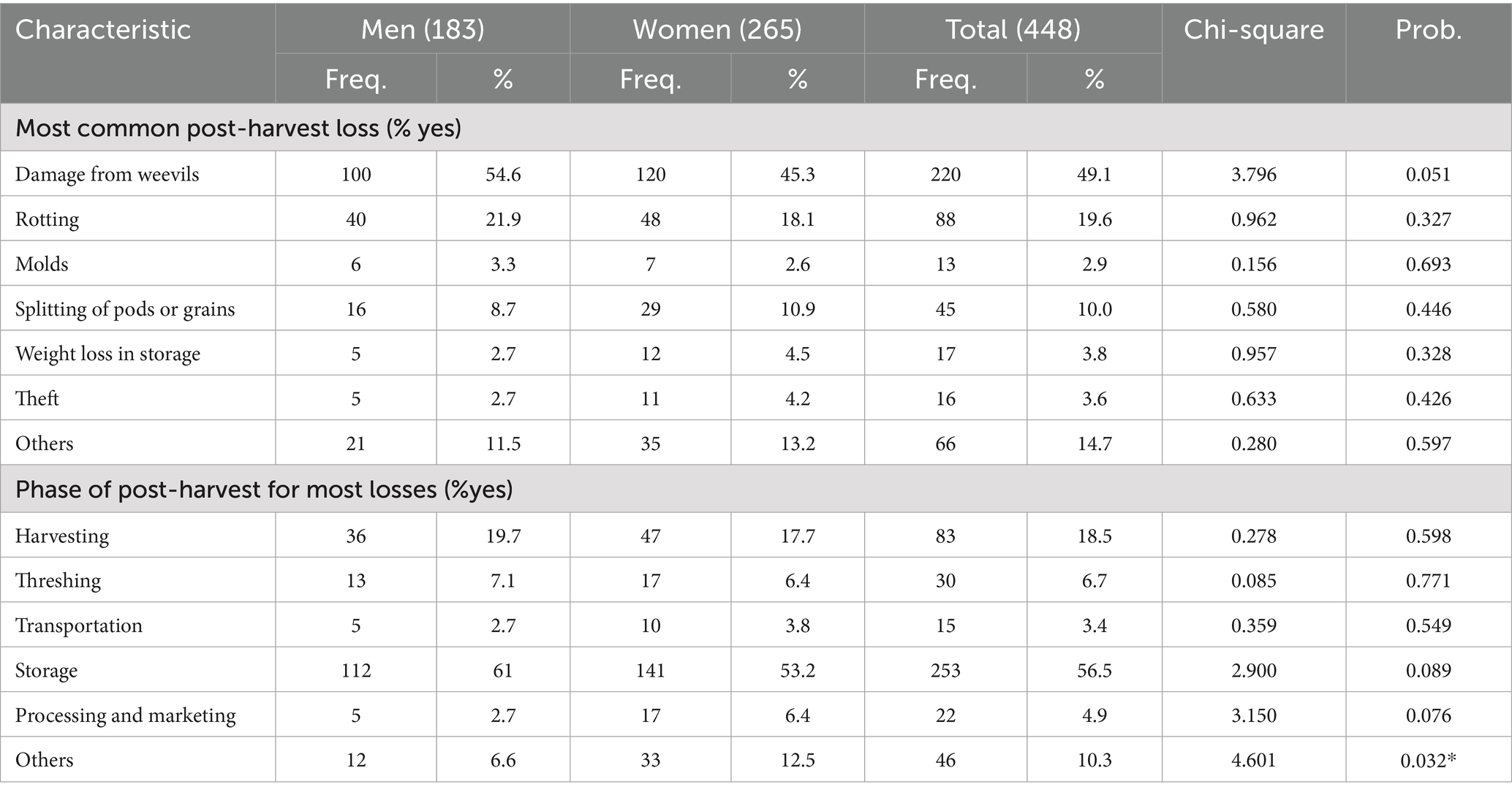
Table 8. Common post-harvest losses and phases for most losses in cowpea production across districts surveyed in Malawi.
Further to this, the study examined the use of various storage methods employed by men and women to mitigate the losses in storage (Figure 4). While the differences were not statistically significant, a notable gender disparity was observed in terms of the methods used. For instance, 49.2% of the men used pesticides compared to 40% of women. Hermetic bags, an effective method for preventing insect infestation and maintaining grain quality during storage, were used by only 11.7% of men and 6.6% of women. Traditional storage methods, which vary by region and culture, showed slight differences in usage between men (16.2%) and women (15.3%), suggesting that traditional practices are well-established and accepted by both genders.
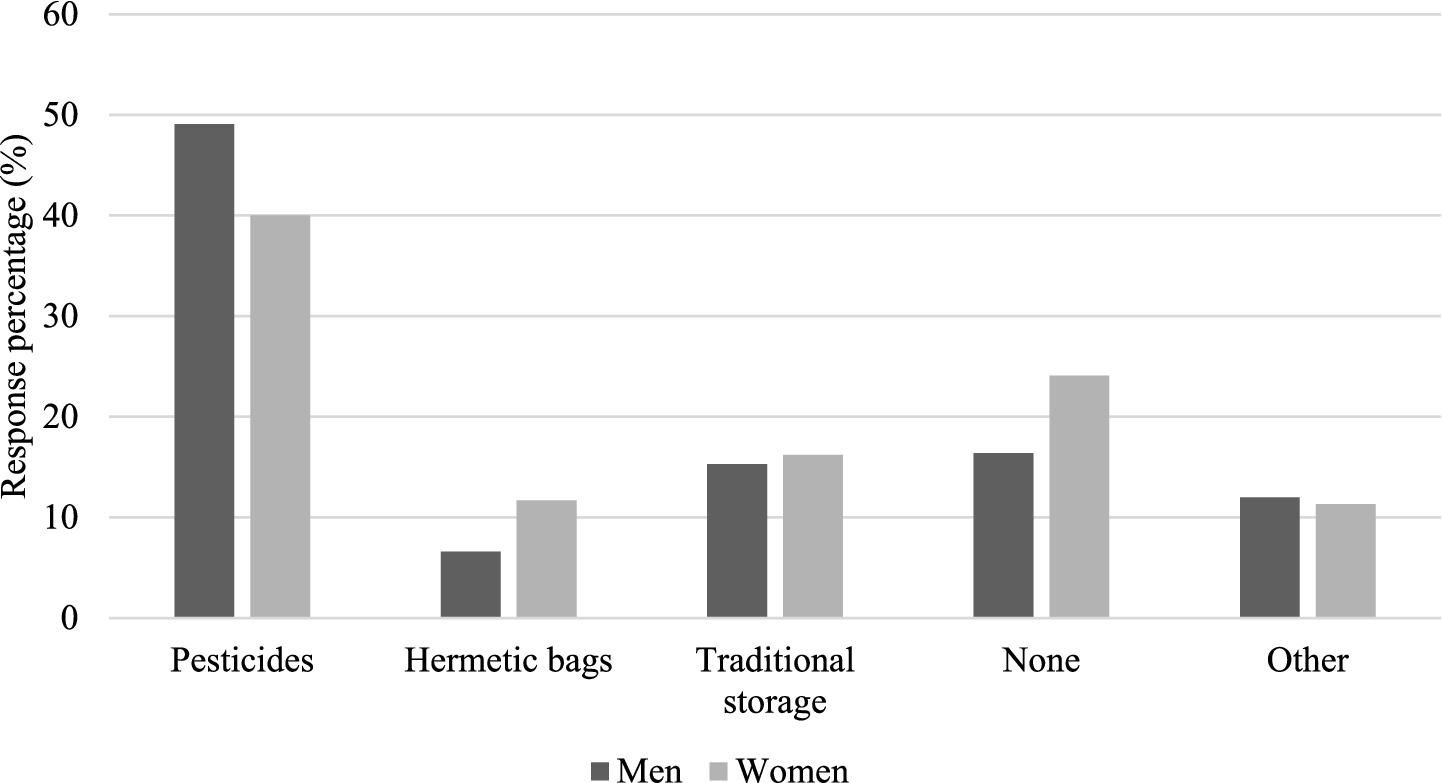
Figure 4. Main methods used to reduce losses during cowpea storage among men and women in districts surveyed in Malawi.
As a coping mechanism, farmers often rely on pesticides such as Actellic, Novatellic, and Shumba Super, combined with traditional storage methods such as ash. While pesticides can provide some degree of control over pests like bruchids, their high cost and improper use pose risks to human health and the environment. Farmers who cannot afford pesticides either depend on traditional storage practices or take no protective measures leading to significant reductions in crop volumes, and rendering the produce unsuitable for consumption or sale, especially when stored for extended periods.
Efforts to promote hermetic storage technology, such as the Purdue Improved Crop Storage (PICS) bags have been promising in Malawi. Studies by Bawa et al. (2025) and Ngwenyama et al. (2020) have demonstrated the effectiveness of this technology in cowpea storage. The key advantage of hermetic storage bags is their reusability and the elimination of the need for chemical treatments. Organizations like Lilongwe University of Agriculture and Natural Resources (LUANAR), National Smallholder Farmers’ Association of Malawi (NASFAM), Catholic Development Commission (CADECOM), and Catholic Relief Services (CRS) have worked to provide farmers with access to this technology. However, challenges remain. A study by Masters and Alvarez (2018) found that farmers’ willingness to pay (WTP) for these bags was significantly below the market price, suggesting a need for further interventions to make this technology more accessible to farmers, particularly women. Addressing these challenges is crucial for enhancing pest management practices during storage, minimizing losses, and ensuring food security and income.
Cowpea marketing dynamics by farmers and constraints
The study also explored the dynamics of cowpea marketing in Malawi, focusing on decision-making processes, market access, and transportation methods. Decision-making regarding cowpea sales varies within households and communities. About 44.6% of men reported that decisions on selling cowpea rest with men, who often serve as household heads. In contrast, 30% of women indicated that women, typically spouses actively involved in cowpea production, play a significant role in these decisions. While men often dominate decision-making as household heads, women contribute substantially, particularly when they are actively engaged in production. This finding aligns with previous research, such as Gondwe et al. (2017), which highlighted women’s active participation in cowpea production decisions within households. However, disparities may arise when it comes to marketing, with men potentially exerting more control over income generated from cowpea production.
Access to established markets is critical for farmers, as it directly influences their income and economic wellbeing. The study found that a significant proportion of farmers reported access to established markets, with significant gender differences. Interestingly, more women (41.5%) than men (35.7%) reported having access to these markets.
Farm gates and local markets emerged as the most common selling points for both men and women. Approximately 24.6% of men and 22.6% of women identified the farm gate as their primary market, while 30.1% of men and 25.3% of women preferred selling at local markets. These preferences are likely driven by accessibility and familiarity, which facilitate smoother transactions. These findings are consistent with previous research by Tadesse et al. (2021) which underscores the importance of local markets in engaging smallholder farmers in agricultural marketing.
Transportation plays a crucial role in enabling farmers to move cowpeas to markets. The study found that many farmers rely on public transport (27.2%) and private push bicycles (22.8%) for transportation. Efficient transportation systems, as evidenced by the widespread use of public transport and bicycles, are vital for enhancing market linkages for smallholder farmers (Ali and Asogwa, 2017).
Despite these dynamics, the study identified several challenges faced by farmers in marketing their cowpea produce. These include limited access to reliable markets, low prices, long distances to markets, high transportation costs, and limited access to market information. Analysis of the results (Tables 9, 10) revealed that these challenges are similarly experienced by both men and women. Addressing these constraints is essential for improving market access, increasing income, and enhancing the livelihoods of cowpea farmers.
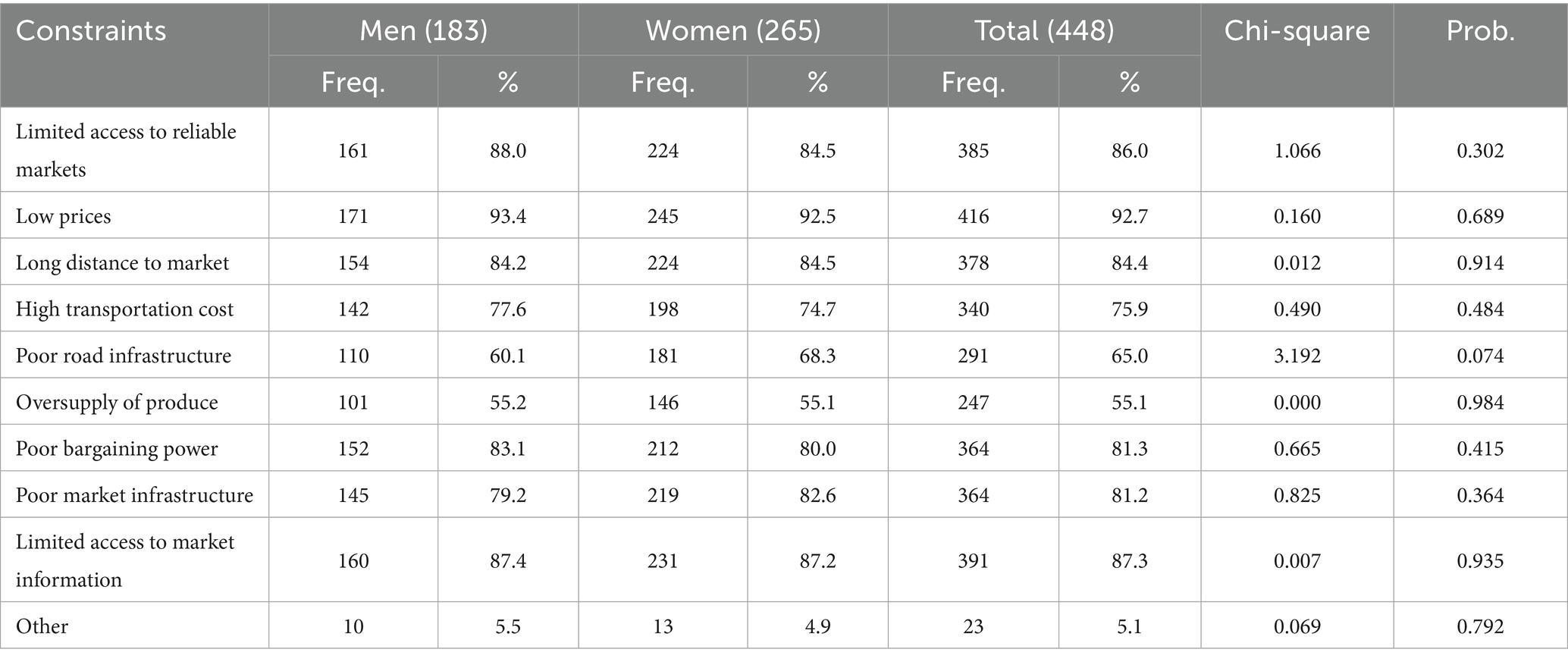
Table 10. Gender analysis of marketing constraints faced by cowpea farmers across districts surveyed in Malawi.
Traders
Most cowpea traders consulted in this study were concentrated in specific districts—Chikwawa, Mulanje, Salima, and Dedza —where cowpea production is also predominant. This alignment between the presence of traders and cowpea production areas highlights the localized nature of cowpea markets. In contrast, traders in Karonga and Mzimba reported that selling cowpea is not profitable in their districts, which explains why the research team struggled to find cowpea traders in the districts. |The study also identified the presence of foreign traders who purchase cowpea for formal or informal exports highlighting the need to strengthen direct market linkages for local traders and farmers.
Traders revealed that they sell cowpea in two primary forms: raw grain for use as a relish, processing, and export, and grain as seed for cowpea production. This finding aligns with earlier observations that smallholder farmers often rely on local markets as a source of seed. The availability of both forms indicates a dual market for cowpea, catering to both agricultural and consumption needs. However, the absence of processed cowpea products in many areas suggests untapped opportunities for value addition within the cowpea value chain.
Most traders reported that they do not consistently purchase cowpea from the same suppliers. This flexibility reflects the dynamic nature of the legume market, where factors such as price fluctuations, product quality, and seasonal availability influence traders’ decisions. In addition, the majority of cowpea traders contacted in the study in both urban and rural markets were men operating from established selling points within the markets. This gender distribution aligns with broader trends in agricultural marketing, where men are more frequently engaged in market-based activities, while women tend to focus on farming and subsistence roles.
Dzanja et al. (2017) found that wholesale trade is dominated by men while women are concentrated at the retail level. This disparity was attributed to women’s limited access to capital which restricts their entry into the wholesale trade. Retailing becomes an attractive livelihood option because retail outlets are typically closer to homes making them more accessible for women who often balance domestic responsibilities.
The study also highlights that cowpea sales serve as an important source of income for women, particularly those selling, green pods, leaves, and processed cowpea products such as snacks. Women engage in door-to-door sales of cowpea leaves, especially in urban areas where there is a steady demand. This finding is consistent with observations from a study in Mali (Smale et al., 2022), which reported that women constituted 99% of the surveyed traders of processed cowpea products in open-air markets and were also the primary sellers of fresh cowpea leaves. Overall, these findings emphasize the need to address gender disparities within the cowpea value chain and explore opportunities to empower women through improved access to resources and market linkages.
Conclusion
This study provides an analysis of the cowpea value chain in Malawi, emphasizing the gendered dimensions of production, marketing, and resource access. The results indicate that while women play a crucial role, they encounter significant barriers that hinder their full participation and benefit. Unlike most previous research, this study uniquely incorporates a gendered approach, examining the roles and participation of both women and men, which is often overlooked.
Additionally, this study offers a detailed mapping of the cowpea value chain, identifying all key actors and their roles from production to consumption. It highlights the preference for local cowpea varieties among farmers and the specific traits they value, which is not extensively covered in other studies. Furthermore, the study underscores the active engagement of youth in cowpea production, providing insights into their unique challenges and opportunities for further engagement.
Addressing these age- and gender-specific constraints through targeted interventions can enhance cowpea productivity, market access, and overall food security in Malawi and beyond. Most importantly, the study unpacks the socio-cultural roles of men and women within the cowpea value chain and its potential to significantly improve food security and nutrition for Malawian farmers. By highlighting the novel aspects of the cowpea value chain, this study contributes significantly to the literature on the socioeconomic and cultural dynamics surrounding the commercial viability of indigenous food crop (IFC) value chains and mainstreaming IFCs for sustainable food and nutrition security, especially in vulnerable populations.
This study further contributes to gendered and age-specific perspectives that allow entry points for specific interventions within the value chain. Future research should focus on developing and promoting age- and gender-sensitive agricultural interventions, practices, and policies aimed at supporting the equitable growth of the cowpea value chain in Malawi and beyond. Examples include establishing local market collection points or cooperatives to facilitate women’s participation, promoting labor-saving technologies such as small-scale processing machines, providing woman-led extension services and group-based training, deploying digital platforms to engage youth with market and climate information, fostering joint household decision-making and encouraging farmers to store cowpea in hermetic bags to prevent weevil infestation. Such interventions have the potential to improve food and nutrition security as well as income generation among smallholder farmers.
Data availability statement
The original contributions presented in the study are included in the article/Supplementary material, further inquiries can be directed to the corresponding author.
Ethics statement
Ethical approval was not required for the studies involving humans in accordance with the local legislation and institutional requirements. The participants provided their written informed consent to participate in this study.
Author contributions
JK-P: Methodology, Writing – original draft, Conceptualization, Data curation, Supervision, Investigation, Visualization, Funding acquisition, Project administration, Validation, Formal analysis, Writing – review & editing, Resources. JK: Methodology, Writing – original draft, Project administration, Formal analysis, Software, Investigation, Data curation. NM: Formal analysis, Writing – review & editing, Data curation, Investigation, Software. MC: Supervision, Methodology, Visualization, Conceptualization, Funding acquisition, Project administration, Investigation, Resources, Writing – review & editing.
Funding
The author(s) declare that financial support was received for the research and/or publication of this article. This study was made possible through a sub-grant award no. 7200AA-19LE-00005 from Cornell University. The contents are the responsibility of the authors and do not necessarily reflect the views of the funder.
Acknowledgments
This study received enormous support from different stakeholders in different ways within the cowpea value chain. Special thanks to the study participants, including farmers, consumers, traders, processors, local leaders, and agriculture extension workers, for giving their consent to participate in this study; sharing their knowledge and expertise in cowpea value chain. In addition, we thank the local authorities for allowing study teams to conduct the studies in the areas of their jurisdiction and helping to mobilize communities to participate in the study. To all our Cornell University and Cultural Practice colleagues as well as all Priority Setting/Cross-Cutting Thematic group colleagues who gave us feedback on our tools, presentations and different versions of our draft manuscript, we are sincerely grateful.
Conflict of interest
The authors declare that the research was conducted in the absence of any commercial or financial relationships that could be construed as a potential conflict of interest.
Generative AI statement
The authors declare that Gen AI was used in the creation of this manuscript. Generative AI was used as a proof reading tool and grammatical edits. Prompts like "assist in rephrasing the following paragraph" or "Assist in making this paragraph grammatically sound and concise" were used where necessary.
Any alternative text (alt text) provided alongside figures in this article has been generated by Frontiers with the support of artificial intelligence and reasonable efforts have been made to ensure accuracy, including review by the authors wherever possible. If you identify any issues, please contact us.
Publisher’s note
All claims expressed in this article are solely those of the authors and do not necessarily represent those of their affiliated organizations, or those of the publisher, the editors and the reviewers. Any product that may be evaluated in this article, or claim that may be made by its manufacturer, is not guaranteed or endorsed by the publisher.
Supplementary material
The Supplementary material for this article can be found online at: https://www.frontiersin.org/articles/10.3389/fsufs.2025.1640999/full#supplementary-material
References
Abebe, B. K., and Alemayehu, M. T. (2022). A review of the nutritional use of cowpea (Vigna unguiculata L. Walp) for human and animal diets. J. Agric. Food Res. 10:100383. doi: 10.1016/j.jafr.2022.100383
Ali, A. N., and Asogwa, S. O. (2017). Road transportation network constraints on food crop production in Uzo-uwani local government area of Enugu state, Nigeria. Afro Asian J. Soc. Sci. 8, 1–21.
Bawa, H. Y. D., Baoua, I. B., Rabé, M. M., and Baributsa, D. (2025). Hermetic Bags Effectively Manage Emerging and Common Pests of Stored Cowpeas in Niger. Insects 16:2. doi: 10.3390/insects16020196
Benson, T. (2020). Promoting participation in value chains for pulses in Malawi: Who and where to target. Intl Food Policy Res Inst. 40, 1–5.
Benson, T., Mabiso, A., and Nankhuni, F. (2016). Detailed crop suitability maps and an agricultural zonation scheme for Malawi: Spatial information for agricultural planning purposes. Paris: International Food Policy Research Institute.
Boukar, O., Belko, N., Chamarthi, S., Togola, A., Batieno, J., Owusu, E., et al. (2019). Cowpea (Vigna unguiculata): genetics, genomics and breeding. Plant Breed. 138, 415–424. doi: 10.1111/pbr.12589
Branca, G., Cacchiarelli, L., D’Amico, V., Dakishoni, L., Lupafya, E., Magalasi, M., et al. (2021). Cereal-Legume Value Chain Analysis: A Case of Smallholder Production in Selected Areas of Malawi. Agriculture 11:12. doi: 10.3390/agriculture11121217
Chagomoka, T., Afari-Sefa, V., and Pitoro, R. (2014). Value chain analysis of traditional vegetables from Malawi and Mozambique. Int. Food Agribus. Manag. Rev. 17, 59–86.
Chinsinga, B., and Chasukwa, M. (2018). Agricultural policy, employment opportunities and social mobility in rural Malawi. Agrarian South: J. Political Econ. CARES 7, 28–50. doi: 10.1177/2277976018758077
Chipeta, M. M., Kampanje-Phiri, J., Moyo, D., Colial, H., Tamba, M., Belarmino, D., et al. (2024). Understanding specific gender dynamics in the cowpea value chain for key traits to inform cowpea breeding programs in Malawi, Mozambique and Tanzania. Front. Sociol. 9:1254292. doi: 10.3389/fsoc.2024.1254292
Coulibaly, O., Alene, A. D., Abdoulaye, T., Chianu, C., Manyong, V., and Aitchedji, C. (2010). Baseline assessment of cowpea breeding and seed delivery efforts to enhance poverty impacts in sub-Saharan Africa. Collaboration with NARS from Mali, Niger, Nigeria, Tanzania, Malawi, Kenya and Mozambique. Tropical Legumes II Project report at: http://www.icrisat.org/what-we-do/impi/projects/tl2-publications/research-reports/rr-cwpsbean.pdf CRP, 3.
Dimande, P., Arrobas, M., and Rodrigues, M. Â. (2024). Intercropped maize and cowpea increased the land equivalent ratio and enhanced crop access to more nitrogen and phosphorus compared to cultivation as sole crops. Sustainability 16:4. doi: 10.3390/su16041440
Dzanja, J., Matita, M., Kankwamba, H., Dolislager, M., and Tschirley, D. (2017). Assessing market prospects for grain legumes in Malawi. Available online at: https://www.researchgate.net/profile/HenryKankwamba/publication/335777431_Assessing_market_prospects_for_grain_legumes_in_Malawi/links/5d7aa6c7299bf1d5a970a664/Assessing-market-prospects-for-grain-legumes-inMalawi.pdf (accessed January 12, 2017).
Egbadzor, K. F., Dadoza, M., Danquah, E. Y., Yeboah, M., Offei, S. K., and Ofori, K. (2013). Genetic control of seed size in cowpea (Vigna unguiculata (L.) Walp). Int. J. Agric. Sci. 5, 367–371.
Enyiukwu, D. (2018). Nutritional significance of cowpea leaves for human consumption. Greener Trends Food Sci. Nutr. 1, 1–10. doi: 10.15580/GTFSN.2018.1.061818085
FAO (2016). Developing Gender-Sensitive Value Chains: A Guiding Framework. Paris: Food and Agriculture Organization of the United Nations.
Gomes, A. M. F., Draper, D., Nhantumbo, N., Massinga, R., Ramalho, J. C., Marques, I., et al. (2021). Diversity of cowpea [Vigna unguiculata (L.) Walp] landraces in Mozambique: new opportunities for crop improvement and future breeding programs. Agronomy 11:5. doi: 10.3390/agronomy11050991
Gomes, A. M. F., Nhantumbo, N., Ferreira-Pinto, M., Massinga, R., Ramalho, J. C., and RibeiroBarros, A. I. (2019). “Breeding Elite Cowpea [Vigna unguiculata (L.) Walp] Varieties for Improved Food Security and Income in Africa: Opportunities and Challenges” in Legume Crops. ed. M. A. El-Esawi (Berlin: Intech).
Gomes, A. M. F., Rodrigues, A. P., António, C., Rodrigues, A. M., Leitão, A. E., Batista-Santos, P., et al. (2020). Drought response of cowpea (Vigna unguiculata (L.) Walp.) landraces at leaf physiological and metabolite profile levels. Environ. Exp. Bot. 175:104060. doi: 10.1016/j.envexpbot.2020.104060
Gondwe, T., Tegbaru, A., Oladeji, A. E., Khonje, M., Manda, J., and Gaya, H. (2017). Correlates and consequences of women’s participation in the cowpea value chain in eastern Zambia. Agrekon 56, 263–273. doi: 10.1080/03031853.2017.1317643
Hella, J. P., Chilongo, T., Mbwag, A. M., Bokosi, J., Kabambe, V., and Riches, C. (2013). Participatory market-led cowpea breeding in Sub- Saharan Africa: Evidence pathway from Malawi and Tanzania. Merit Research Journal of Agricultural Science and Soil Sciences (ISSN: 2350-2274) Vol. 1(2) pp. 011-018. Available online http://www.meritresearchjournals.org/asss/index.htm
Kebede, E., and Bekeko, Z. (2020). Expounding the production and importance of cowpea (Vigna unguiculata (L.) Walp.) in Ethiopia. Cogent Food Agric. 6:1769805. doi: 10.1080/23311932.2020.1769805
Kirse, A., and Karklina, D. (2015). Integrated evaluation of cowpea (Vigna unguiculata (L.) Walp.) and maple pea (Pisum sativum var. arvense L.) spreads. Agron. Res. 13, 956–968.
Kundhlande, G., Franzel, S., Simpson, B., and Gausi, E. (2016). Farmer-to-farmer extension approaches in Malawi: A Survey of Organizations using the approach ICRAF Working Paper No. 183. Nairobi: World Agroforestry Centre.
Laven, A., and Verhart, N. (2011). Addressing gender equality in agricultural value chains: Sharing work in progress. Nijmegen, The Netherlands. 17pp.
Malidadi, C. (2006). Cowpea (Vigna unguiculata (L.) Walp.) for leafy vegetable use in Malawi: Agronomic evaluation on station and on farm. Gottingen: University of Gottingen.
Mango, N., Mapemba, L., Tchale, H., Makate, C., Dunjana, N., and Lundy, M. (2018). Maize value chain analysis: a case of smallholder maize production and marketing in selected areas of Malawi and Mozambique. Cogent Bus Manag 5:1503220. doi: 10.1080/23311975.2018.1503220
Masters, W., and Alvarez, G. G. (2018). Willingness to Pay for Hermetic Grain Storage Bags in Malawi (No. 277295). International Association of Agricultural Economists.
Me-Nsope, N., and Larkins, M. (2016). Beyond crop production: Gender relations along the pigeon pea value chain and implications for income and food security in Malawi. J. Gender Agric. Food Secur. 1, 1–22.
Mohammed, S. B., Mohammad, I. F., Pangirayi, T. B., Vernon, G., Dzidzienyo, D. K., Umar, M. L., et al. (2020). Farmers’ knowledge, perception, and use of phosphorus fertilization for cowpea production in Northern Guinea Savannah of Nigeria. Heliyon 6:e05207. doi: 10.1016/j.heliyon.2020.e05207
Muchemwa, M. N., Kalaluka, M., Mick, M., Kelvin, K., Tamala, K., Aaron, S., et al. (2022). Situational analyses on cowpea value chain in Zambia: the case of an untapped legume. Cogent Food Agric. 8:2094060. doi: 10.1080/23311932.2022.2094060
Muyanga, M., Nyirenda, Z., Lifeyo, Y., and Burke, W. J. (2020). The future of smallholder farming in Malawi. MwAPata Working Paper no. 20/02. Available at: https://ageconsearch.umn.edu/record/319855
Nakano, Y., and Magezi, E. F. (2020). The impact of microcredit on agricultural technology adoption and productivity: evidence from randomized control trial in Tanzania. World Dev. 133:104997. doi: 10.1016/j.worlddev.2020.104997
Ngwenyama, P., Mvumi, B. M., Nyanga, L. K., Stathers, T. E., and Siziba, S. (2020). Comparative performance of five hermetic bag brands during on-farm smallholder cowpea (Vigna unguiculata L.Walp) storage. J. Stored Prod. Res. 88:101658. doi: 10.1016/j.jspr.2020.101658
Nkhoma, N., Shimelis, H., Laing, M. D., Shayanowako, A., and Mathew, I. (2020). Assessing the genetic diversity of cowpea [Vigna unguiculata (L.) Walp.] germplasm collections using phenotypic traits and SNP markers. BMC Genet. 21:110. doi: 10.1186/s12863-020-00914-7
Nkongolo, K., Bokosi, J., Malusi, M., Vokhiwa, Z., and Mphepo, M. (2009). Agronomic, culinary, and genetic characterization of selected cowpea elite lines using farmers’ and breeder’s knowledge: a case study from Malawi. African J. Plant Sci. 3, 147–156.
Nsa, I. Y., and Kareem, K. T. (2015). Additive interactions of unrelated viruses in mixed infections of cowpea (Vigna unguiculata L. Walp). Front. Plant Sci. 6:812. doi: 10.3389/fpls.2015.00812
Okiror, J. J., Twanza, B., Orum, B., Ebanyat, P., Kule, E. B., Tegbaru, A., et al. (2021). For whom will the crop be promoted? A search for gender equity along the grain-legume value chains in Uganda. J. Agric. Ext. Rural Dev. 13, 252–264. doi: 10.5897/JAERD2017.0872
Poulsen, E. (2016). Gender mainstreaming in agricultural value chains: Promising experiences and the role of rural advisory services. Lausanne: GFRAS.
Pyburn, R., Slavchevska, V., and Kruijssen, F. (2023). Gender dynamics in agrifood value chains: advances in research and practice over the last decade. Glob. Food Secur. 39:100721. doi: 10.1016/j.gfs.2023.100721
Quisumbing, A., Heckert, J., Faas, S., Ramani, G., Raghunathan, K., Malapit, H., et al. (2021). Women’s empowerment and gender equality in agricultural value chains: evidence from four countries in Asia and Africa Food Secur 13, 1101–1124. doi: 10.1007/s12571-021-01193-5
Rubin, D., Boonabaana, B., and Manfre, C. (2019). Building an inclusive agriculture: Strengthening gender equality in agricultural value chains. In 2019 Annual trends and outlook report: Gender equality in rural Africa: From commitments to outcomes, eds. A. Quisumbing, R. Meinzen-Dick, R. Suseela, and N. Jemimah Chapter 6, (Washington, DC: International Food Policy Research Institute (IFPRI)), pp. 83–96. Available at: https://hdl.handle.net/10568/146513
Rubin, D., and Manfre, C. (2014). “Promoting Gender-Equitable Agricultural Value Chains: Issues, Opportunities, and Next Steps” in Gender in Agriculture. eds. A. R. Quisumbing, R. Meinzen-Dick, T. L. Raney, A. Croppenstedt, J. A. Behrman, and A. Peterman (Cham: Springer Netherlands), 287–313.
Rubin, D., Manfre, C., and Nichols, B. K. (2009). Promoting gender equitable opportunities in agricultural value chains: A handbook. New York, NY: U.S. Agency for International Development.
Rusike, J., Brand, G., Boahen, S., Dashiell, K., Kantengwa, S., Ongoma, J., et al. (2019). Value chain analyses of grain legumes in N2Africa. Gates Open Res. 3:706. doi: 10.21955/gatesopenres.1115335.1
Silberg, T. R., Richardson, R. B., Hockett, M., and Snapp, S. S. (2017). Maize-legume intercropping in central Malawi: determinants of practice. Int. J. Agric. Sustain. 15, 662–680. doi: 10.1080/14735903.2017.1375070
Smale, M., Theriault, V., Allen, A., and Sissoko, M. (2022). Is cowpea a ‘women’s crop’ in Mali? Implications for value chain development. Afr. J. Agric. Resour. Econ. 22:3971. doi: 10.22004/ag.econ.333971
Snapp, S., Rahmanian, M., Batello, C., and Calles, T. (2018). Pulse crops for sustainable farms in SubSaharan Africa. Paris: FAO.
Stephenson, K. B., Agapova, S. E., Divala, O., Kaimila, Y., Maleta, K. M., Thakwalakwa, C., et al. (2017). Complementary feeding with cowpea reduces growth faltering in rural Malawian infants: A blind, randomized controlled clinical trial. Am. J. Clin. Nutr. 106, 1500–1507. doi: 10.3945/ajcn.117.160986
Tadesse, B., Tilahun, Y., Bekele, T., and Mekonen, G. (2021). Assessment of challenges of crop production and marketing in Bench-Sheko, Kaffa, Sheka, and West-Omo zones of southwest Ethiopia. Heliyon 7:e07319. doi: 10.1016/j.heliyon.2021.e07319
Tazerouni, Z., Rezaei, M., and Talebi, A. A. (2019). “Cowpea: Insect Pest Management” in Agricultural Research Updates. ed. P. Gorawala (London: Nova Science Publishers Inc).
Uduji, J. I., and Okolo-Obasi, E. N. (2024). Promoting gender–equitable agricultural value chains: the role of corporate social responsibility in Nigeria’s Niger Delta. J. Agribus. Dev. Emerg. Econ. 14, 536–551. doi: 10.1108/JADEE-07-2022-0143
Vanlauwe, B., Hungria, M., Kanampiu, F., and Giller, K. E. (2019). The role of legumes in the sustainable intensification of African smallholder agriculture: Lessons learnt and challenges for the future. Agric. Ecosyst. Environ. 284:106583. doi: 10.1016/j.agee.2019.106583
Yigezu, Y. A., Mugera, A., El-Shater, T., Aw-Hassan, A., Piggin, C., Haddad, A., et al. (2018). Enhancing adoption of agricultural technologies requiring high initial investment among smallholders. Technol. Forecast. Soc. Change 134, 199–206. doi: 10.1016/j.techfore.2018.06.006
Keywords: cowpea value chain, gender perspective, food security, smallholder farmers, trait preferences, improved varieties, indigenous crop
Citation: Kampanje-Phiri JJ, Kafwambira J, Mvula N and Chipeta MM (2025) Understanding cowpea production, utilization and distribution dynamics in Malawi: a gendered perspective. Front. Sustain. Food Syst. 9:1640999. doi: 10.3389/fsufs.2025.1640999
Edited by:
Kwaku Gyebi Duodu, University of Pretoria, South AfricaReviewed by:
Theophilus Kwabla Tengey, CSIR-Savanna Agricultural Research Institute, GhanaRabe Mahamane Moctar, Universite Djibo Hamani De Tahoua, Niger
Copyright © 2025 Kampanje-Phiri, Kafwambira, Mvula and Chipeta. This is an open-access article distributed under the terms of the Creative Commons Attribution License (CC BY). The use, distribution or reproduction in other forums is permitted, provided the original author(s) and the copyright owner(s) are credited and that the original publication in this journal is cited, in accordance with accepted academic practice. No use, distribution or reproduction is permitted which does not comply with these terms.
*Correspondence: Jessica Jemima Kampanje-Phiri, amthbXBhbmplQGx1YW5hci5hYy5tdw==; amprYW1wYW5qZUBnbWFpbC5jb20=
 Jessica Jemima Kampanje-Phiri
Jessica Jemima Kampanje-Phiri John Kafwambira
John Kafwambira Naomi Mvula
Naomi Mvula Michael M. Chipeta
Michael M. Chipeta